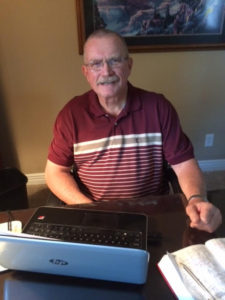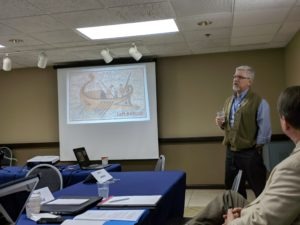Letter from the Director – June 2018


ELCA LEADERS DO NOT HONOR COMMITMENTS, RESPECT BOUNDARIES, OR RECOGNIZE THEIR OWN INCONSISTENCIES
LETTER FROM THE DIRECTOR – JUNE 2018
Recent events in the ELCA blatantly reveal that ELCA leaders have no intent to honor the commitments that were made and the boundaries that were set as part of the decisions on human sexuality at the 2009 Churchwide Assembly.
The social statement, “Human Sexuality: Gift and Trust,” which was approved by that assembly, clearly states that there is not agreement within the ELCA and that there would be a place for a wide variety of views, including the traditional view, within the church. But many who hold to the traditional view feel that all of the actions and positions taken by the ELCA since then have favored those who agree with same sex marriage and even those who are advocating for all sorts of other sexual identities and expressions. Recent events at United Lutheran Seminary, formed by the merger of Philadelphia and Gettysburg Seminaries, show just how much disfavor there is even against someone who held a traditional view twenty years ago.
Members of the LGBTQIA+ community at United Lutheran Seminary have been complaining loudly about how hurt, wounded, traumatized, and unsafe they feel because of the choice that was made for the first president of that institution. Great effort has been expended by ELCA leaders to help them feel safe. A letter written by one ELCA bishop came across to me as groveling in front of that part of the student body. In our view recent events at the seminary should lead anyone who has ever held a traditional view on human sexuality to feel unsafe. I have read various reports on the reasons for the recent firing of the president, Dr. Theresa Latini. For me any of those reasons is problematic.
If Dr. Latini was fired because twenty years ago she held a traditional view, even though she fully embraces the LGBTQIA+ agenda today, that is problematic, because it shows that anyone who has ever held a traditional view is unacceptable and their employment is not safe.
Some of the reports say that she was fired because twenty years ago she was director of an organization that advocates for and practices reparative or conversion therapy. I have spoken with the president of the board of OnebyOne, the organization that she was director of back in the 1990’s. He emphatically stated that that organization has never been an advocate for and has never practiced reparative therapy. Instead they are an educational arm of the church, which speaks to groups about hope and healing in Jesus. So if once being director of an organization that advocates for and practices reparative therapy is the reason she was fired, that reason also is problematic, because it is based upon an untruth.
Some say that Dr. Latini was fired because she did not disclose to the interviewing committee her previous involvement with OnebyOne. If that is the reason, that also is problematic, because, as I understand it, she did disclose her previous involvement to the chairperson of the board, who felt that she did not need to further disclose her previous involvement.
So, if any of those three was the reason for her being fired, they are all problematic, and they definitely show that the person who should feel unsafe in the ELCA is not a member of the LGBTQIA+ community, but instead anyone who now holds or has ever held a traditional view on human sexuality.
The above is just one more example of how the ELCA is not honoring its commitments to provide a place of inclusion, value, safety, respect, and honor for the traditional view on human sexuality. Why would I say that the leaders of the ELCA are not respecting the boundaries that were set by the 2009 Churchwide Assembly?
One needs look no further than the list of keynote speakers for the ELCA’s National Youth Gathering, which will be held at the end of this month in Houston. One of the keynote speakers is a member of the “We Are Naked and Unashamed” movement, which arose out of the student body of the Lutheran School of Theology in Chicago and rejects marriage by any definition (whether same gender or opposite gender) as normative for sexuality activity. Another keynote speaker is a leader in the DeColonize Lutheranism movement, which feels that Lutheranism needs to be delivered from white, male, and northern European dominance and oppression. A third keynote speaker is a mother and her twelve-year-old son, who wants to be a girl, who will be advocating for transgender issues.
The 2009 ELCA Churchwide Assembly addressed a specific and narrowly defined subset of same-sex relationships, namely those that are publicly accountable, lifelong, and monogamous (PALMS). It never addressed bisexuality or the issue of transgender persons or any of the other forms of sexual identity and expression that are a part of the LGBTQIA+ movement. And yet what do we see the ELCA doing less than nine years later? Totally catering to the LGBTQIA+ community within seminary student bodies, doing nothing to renounce the “We Are Naked and Unashamed” movement, and inviting a transgender activist to speak to 30, 000 young people at the National Youth Gathering.
Pastor Mark Erson, Chair of the Commission for LGBTQIA+ People in the ELCA’s Metro New York Synod, recently sent out an email in which he stated, “Our commission, that was formed in 2000 to implement our RIC (Reconciled in Christ) practice, was called the Commission for Gay and Lesbian People, but now there are a lot more letters that are used to identify members of this community.” They know full well that what they are pushing for is going way beyond what was approved in 2009.
Where is the honesty – where is the integrity – when ELCA leaders are endorsing, promoting, and allowing something far beyond what was agreed to and approved at the 2009 Churchwide Assembly? How can the ELCA claim to be an advocate for justice when it acts so unjustly? How could anyone who holds to a traditional view on human sexuality feel included, valued, honored, respected, and safe?
The ELCA suffers from nothing less than a massive breach of trust because of the way in which the actions of the ELCA since 2009 have been so different from what was actually approved in 2009.
If those are examples of how ELCA leaders are neither honoring commitments nor respecting boundaries, what do I mean when I say that they are not recognizing their own inconsistencies?
One ELCA synod had as part of its recent assembly a service of worship that featured Native leaders and Native music. The invitation from the synod said, “Join us as we reflect on the respect we owe the original inhabitants of the lands that make up our synod, repent of the harm done to Native populations . . . and commit ourselves to new levels of respect and regard.”
I cannot imagine their reflecting on the respect they owe to the original, orthodox leaders of the Lutheran Church. I cannot imagine their repenting of the harm they have done when they have bullied, isolated, and marginalized those with a traditional view of the authority of the Bible, Lutheran theology, human sexuality, and the mission of the church. I cannot imagine their repenting of the harm they have done to so many congregations because of the relentless LGBTQIA+ agenda. I cannot imagine their committing themselves to new levels of respect and regard for the traditional, orthodox people who planted the churches, built and paid for the buildings, and started the social service agencies within the territory of that synod. It amazes me how a synod can balance its budget by selling buildings of closed congregations – buildings that were built and paid for by people whose theology, moral values, and mission priorities they reject.
What kind of a future does a church body have that is doing things like that?
Dennis D. Nelson
President of the Board and Director of Lutheran CORE









 Brian describes his county as 90% unchurched, which is very different from deep, dark Lutheranism. He said, “The church culture has been bled out.”
Brian describes his county as 90% unchurched, which is very different from deep, dark Lutheranism. He said, “The church culture has been bled out.”